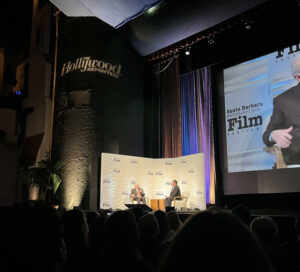On February 10, five international directors were invited to the Santa Barbara International Film Festival to speak about their films. Matteo Garrone, Wim Wenders, IIker Çatak, and Johnnie Burn. Spanish director J. A. Bayona was also invited, but couldn’t make it. It was for a good reason though, as he was nominated for three Goya awards in Spain. He did provide a short presentation on his film, Society of the Snow. In recent times, the world has become competitive and uncaring. Think of social media, how people compare their lives to others in a parasocial popularity contest. What Bayona wanted to do with Society of the Snow is to make a change, showing how people must work past their differences, biases, and competitive nature to survive.
The panel began with Johnnie Burn. He was the sound designer for the film The Zone of Interest. The film takes place in 1943 Nazi Germany, centering around German officer Rudolf Höss. He is trying to build a life for his family in their new home right next to the Auschwitz concentration camp. Burn described it as a horror film crossed with a family drama. It’s shot like a documentary, through which the family drama is told. The horrorscape of sound is then added in post production. Burn explained that when you see a film you understand it, but when you hear a film, you feel it. Sounds resonate deeply with our emotions, and that was the key part of this film. In fact, there are no scenes showing the inside of Auschwitz. Everything is done with sound.
Next up was IIker Çatak, the director and writer of The Teachers’ Lounge. The film takes place in a school, which is an allegory for a country. The dean is the president, and the students are the people. It’s an elaborate metaphor for society, commenting on how subjective truth has become. It’s filmed in a 4:3 aspect ratio, smaller than is usually on the big screen. This visually puts pressure on the characters, creating a “prison in isolation.” Çatak explained that their world is shifting towards authoritarianism, and the film tells that story. “We live in a democracy because somebody said ‘no’ to authoritarianism.”
Matteo Garrone directed, produced, and wrote his film Io Capitano. The film is about the journey African migrants take to find a better life in Europe. Garrone described it as showing the human tragedy that we don’t see. Accuracy was very important to Garrone. Most of the extras in the film are people who made the journey themselves, and Garrone treated them as co-directors. He wanted a balance between realism and cinematography, like “a dark fairy tale.” The film was shot chronologically, meaning that the actors were living out this journey as true to life as possible. These migrants are risking their lives for a better chance, while fighting a system that isn’t in their favor.
Last, but certainly not least, Win Wenders spoke about his film Perfect Days. He directed, produced and wrote it. Simply, the film is about a man who cleans toilets. In reality, it’s a film about emotion and happiness. The protagonist, Hirayama, has a relatively silent performance. The music tells the story for him. The goal of Perfect Days for Wenders was getting the audience to begin observing the world like Hirayama does. See the small details, appreciate the beauty of every moment. Wenders complimented Kōji Yakusho’s acting skills, saying he was the perfect person to play Hirayama. Wenders recalled Yakusho’s performance during one of the final scenes of the film. “I looked at my camera man and I realized that he couldn’t shoot anymore because he was weeping.” It’s the beauty in the simplicity of it all.
All of these films are excellent, and it’s no wonder why they are all being featured at the Santa Barbara International Film Festival this year. From political allegories to African migrants, from the horror of Nazi Germany to the beauty of a simple life, I would recommend checking out all of these films.






Be First to Comment